
What Tropical Plants Grow Well in Louisville and Southern Indiana? And How Do They Winter?
Tropical Plants Can be Grown as Far North as New York. But Which Ones Will Thrive Best in Kentuckiana, and How Do They Survive the Winter?
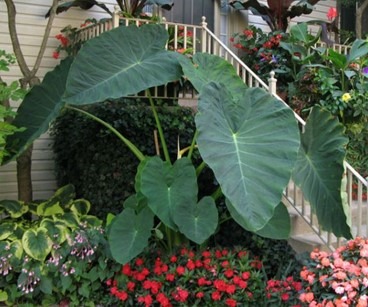
Many gardeners and landscapers might love to have the vibrant colors, fragrant aromas, huge foliage and even the sweet fruit of tropical plants added to their landscape and gardens. But you might think that tropicals just don’t grow in the Zone 6 hardiness climate of Louisville and Southern Indiana, or that ‘wintering’ these plants is too much work. Good news! There are plenty of tropicals hardy enough for Zone 6, and some of them can either stay where they are for the Winter, or require very little Winter maintenance after they have grown for most of the Summer and often into or through Fall.
Take a look at some of these amazing Tropical options, plus the tips and instructions for maintenance and winterizing.
General Wintering Tips for Tropicals in Zone 6
- Read the Labels: Use only plants that can survive in Hardiness Zone 6 or colder, and follow the directions for water, shade, sun, wintering, fertilizing, soil, etc.
- Plenty of Mulch: Add plenty of mulch for tropicals, and refresh regularly (e.g., monthly), to help protect the roots (if staying planted for the Winter) and to keep moisture locked in while keeping weeds blocked.
- Water, Water, Water: At least weekly (but daily in the first week or two if planting), give these plants plenty to drink, as they’re made for humidity. They won’t survive well in extremely dry climates, but here in the Ohio River Valley of Louisville and Southern Indiana, the humid summers will help keep these plants alive and thriving, along with help from the hose.
- Add Fertilizer: Look for fertilizers made for tropicals, and add per the instructions, i.e., when planting and when watering.
Large and Dense Greens for a Bit of Jungle in the Landscape
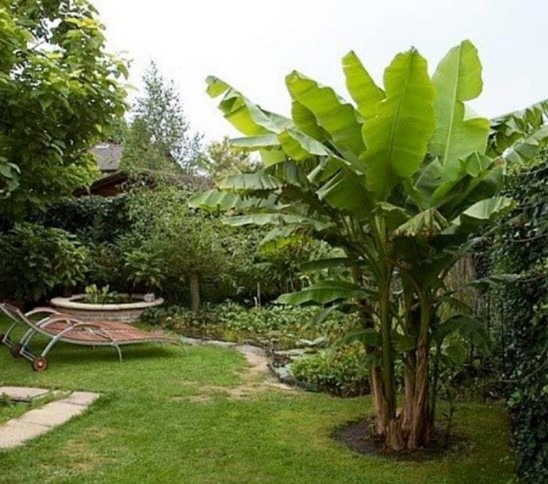
- Elephant Ears (shown above)
- Banana Plants (at left)
- Hardy Ferns
These large-leaf hardy tropicals, Elephant Ears and Banana Plants, can provide a dramatic and exotic focal point in a corner or center of a landscape. They can also be very effective for providing shade to other perennials, and even for people! Their leaves may actually be as large as people, and the Banana Plant can grow as high as 13 feet. Locally, the Banana Plants won’t bear fruit, but they are spectacularly ornamental.
Hardy Ferns are also very effective and lovely for more of a dense, forest floor appearance, which works well as a ground cover combined with your native perennial and annual flowering plants.
Wintering and Further Details:
- Banana Plants: The Banana plant variety in our area are called Basjoo. For winterizing, cut them to the ground after the first frost, and cover the stumps heavily with mulch. They should survive the winter and grow again in the Spring.
- Elephant Ears: If planted (instead of pots) In Zone 6 or colder, Elephant Ear bulbs need to be dug up after first frost, kept in a dry and cool climate through the winter, and then replanted in the Spring.
- Hardy Ferns: There are many varieties of Hardy Ferns that survive extremely cold Winters, and they don’t need Winter accommodations in Zone 6. They do generally need shade. Contact us at Walnut Ridge to consult on what’s available, and what will work best in your landscape.
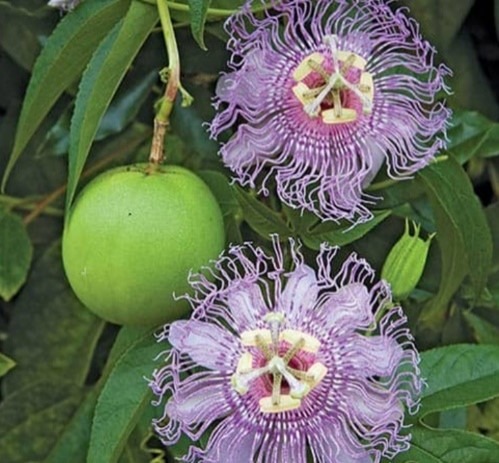
How About Exotic Looking Fruit Plants for a Taste of Something Different?
- “Passion Vine” May Pop, (at right)
- Chicago Hardy Fig Trees (below)
- Paw Paw
It’s an unexpected treat for family and guests when you serve fruit in Kentuckiana, fresh from your own yard or garden … especially if they are lesser-known around these parts, like May Pops and Paw Paws. Figs are well known, but many don’t realize they can be easily grown here, which is why the Chicago Hardy Fig Tree is suggested, as it survives Winters much colder than ours, and it yields delicious fig fruit as well as splendid jungle-like foliage. The May Pop (“Passion Vine” in this region) is a vine that yields a spectacular flower as well as a sweet fruit, so give it room and a trellis to climb. The Paw Paw doesn’t flower, but it adds a tropical-looking touch, and its fruit is said to taste like banana custard!
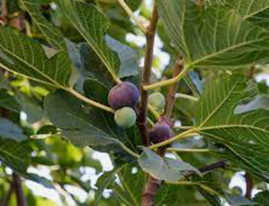
These suggested fruit trees, while adding a tropical look as well as the bonus of fruit, can survive our Winters without transplanting or any special care, other than the mulching suggested for all tropicals to keep their roots protected and moist.
Flowering Tropicals for Dramatic Flare of Color and Unexpected Aroma
- Canna Lily (below)
- Hardy Hibiscus (right)
- Hardy Jasmine
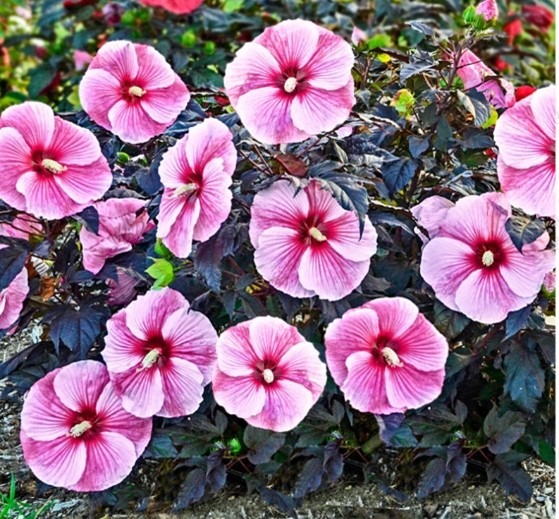
What is that amazing, unusual scent? What is that gorgeous flower? Your flowering perennial tropicals will catch attention because they are not only spectacular, but different … in aroma as well as appearance. They can make an extraordinary addition to a garden with minimal extra care.
Hardy Hibiscus (with “Starry Starry Night” Hibiscus shown here) are eye-catching due to their size as well as their stunning varieties of colors. They grow as large as dinner plates, and their foliage adds a nice, dense green to help the rest of your garden flowers pop. They Winter well on their own, and they bloom through the Summer and Fall.
Jasmine has an unmistakably attractive scent, so it’s very fortunate that there’s a beautiful and aromatic Hardy Jasmine to weather our Winters in Zone 6. In fact, a good cold spell in Winter helps them thrive. Give this vine a trellis to climb!
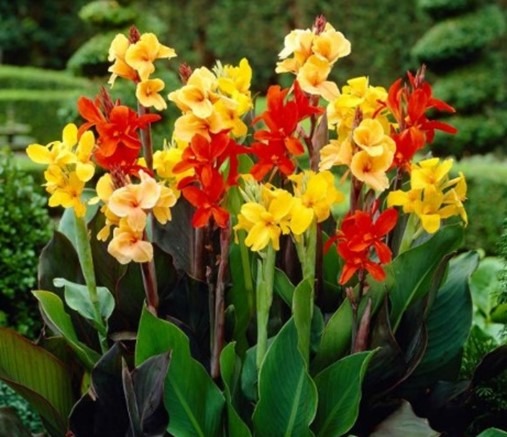
Canna Lilies, standing tall (48-60 inches) among your perennials, can be a little more familiar in the Ohio River Valley, but they do add tropical flare of foliage as well as bloom, and their variety of color is virtually infinite. Among flowering tropicals, Canna Lilies are the least hardy; In Zone 6, their bulbs need to be dug up in the Fall, and replanted in the Winter.
Where do you find these exotics and more? What will work best in your yard or garden? Feel free to call us at Walnut Ridge, 812-288-6691, for information on getting access to these and other plants, and how to care for them. We don’t always have all of the tropicals in stock, but we can place orders or point you in the right direction, and we can give you plenty of tips for tropicals that best fit your landscape and garden.

